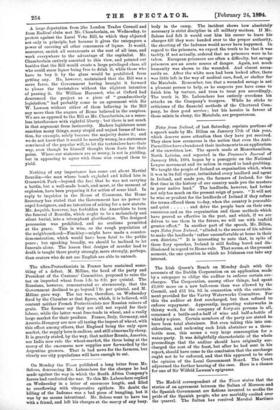A large deputation from ithe London Trades Council and from
Radical clubs met Mr. Chamberlain, on Wednesday, to
protest against the Local Veto Bill, to which they objected not only in principle, but because it gives the ratepayers a power of coercing all other consumers of liquor. It would, moreover, enrich all restaurants at the cost of all-inns, and work everywhere to the advantage of the capitalist. Mr. Chamberlain entirely assented to this view, and pointed out besides that the Bill would create a large privileged class, all who could store liquor being free to drink it, while those who have to buy it by the glass would be prohibited from getting any. He, however, maintained that the Bill was a mere farce, the Government having brought it forward to please the teetotalers without the slightest intention of passing it. Sir William Harcourt, who at Oxford had denounced the project as a piece of " grandmotherly legislation," had probably come to an agreement with Sir W. Lawson without either of them believing in the Bill any more than the augurs of Rome believed in the auspices. We are as opposed to the Bill as Mr. Chamberlain, as a sense- less interference with rightful liberty ; but there is not much in that argument from insincerity. Modern legislators must sanction many things, many stupid and unjust forms of taxa- tion, for example, solely because the majority desire it; and we do not know that it would be morally wrong, in a statesman convinced of the popular will, to let the teetotalers have their way, even though he himself thought them fools for their pains. Where our statesmen are so wrong, is not in yielding, but in appearing to agree with those who compel them to yield.


































 Previous page
Previous page